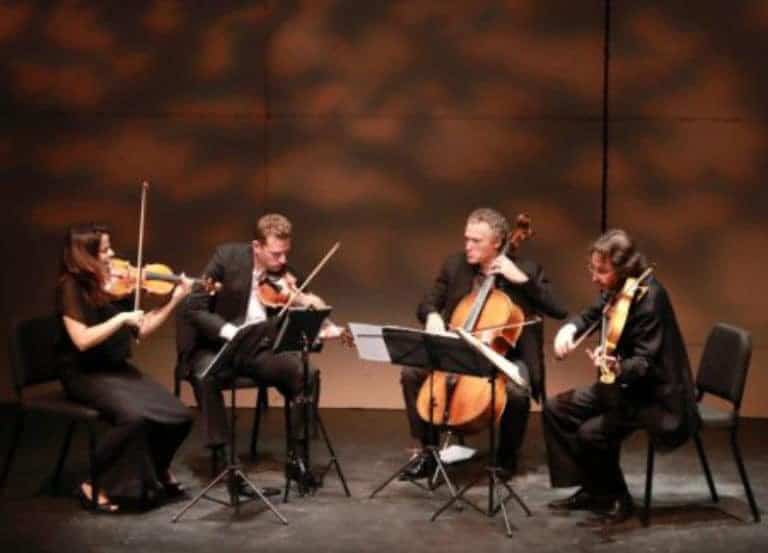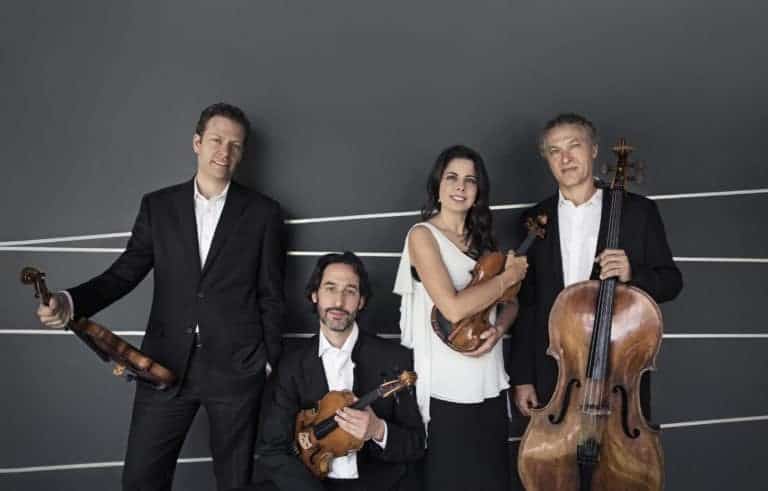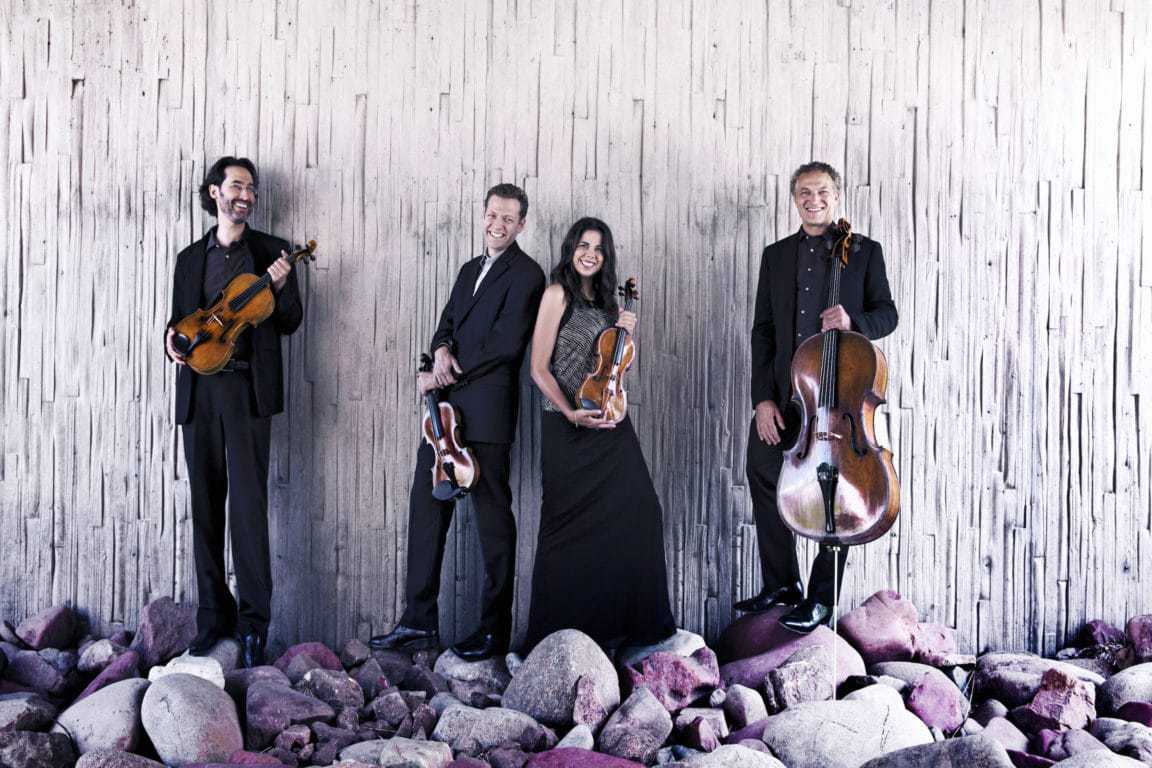After performing for 22 years, and with no member changes in the last 17, the Pacifica Quartet announced last May that half the group was leaving the ensemble. Violinist Sibbi Bernhardsson and violist Masumi Per Rostad had accepted teaching positions at the Oberlin Conservatory School of Music and the Eastman School of Music respectively.
The remaining (and founding) members, husband and wife team Simin Ganatra and Brandon Vamos, chose two new members: violinist Austin Hartman (first violinist with the Biava Quartet for 12 years) and Israeli violist Guy Ben-Ziony, who has been playing chamber music in Europe for several years. This new incarnation of the group performed at a Friends of Chamber Music concert in Portland earlier this month.

Although these changes were bittersweet, they were also invigorating. “We’ve had the opportunity to dream up what would be the perfect quartet,” Ganatra said.
I had never interviewed a group that had experienced such a profound change so recently and I was very curious about how they went about replacing half the group and its impact on one of the world’s premier chamber ensembles.
Seeking Chemistry
Ganatra and Vamos looked for musicians whom they liked personally, which is important for a group that spends a lot of time working closely together, but also players who inspired them. Before making a final decision, the two original members rehearsed with the new candidates. They were looking for a common language — general agreement about phrasing and color, and for the right chemistry.
Evidently they didn’t have to talk very much. Even in the beginning, there was an understanding communicated in the playing itself. Vamos has played in mixed groups where you had to discuss everything. But for the string quartet, “It’s important that some of it is just instinctual,” he explains. “If you have the chemistry you can speak less, and that’s a good thing.”
Consequences of Change
Vamos believes that the Pacifica’s sound has changed, but that it’s difficult to characterize the change. “Maybe there’s a different approach to articulation. And, of course, they’re playing two different instruments — not just different players but different instruments, and that does affect the quartet’s sound.” He hears it from inside and he’d like to hear what the four of them sound like from the audience, but, well, he can’t do that.

What they can say is how the change has affected the group’s own perceptions and practices. “We’ve been playing the same repertoire for 17 years with the same people,” Vamos says. “You throw two new people into that mix, and all the dynamics change!” So far, Ganatra feels there’s more spontaneity, an energy that feels fresh, and that more is happening in the moment, which is always what they strive for.
The group also spends much more time (five hours per day recently) rehearsing than they used to because of the need to get their repertoire up to speed with the new players. According to Ganatra, it will take 1 1/2 years to get back to the amount of repertoire they had, so they’re doing a kind of “crash course.” They’re getting ready to perform a Beethoven cycle in February, and that’s a lot of music (16 string quartets)!
Dual Roles
Adding members isn’t the only recent change the group has experienced. They’re also coping with the challenges of parenting while performing. I’ve always admired the stamina of musicians who travel so much, and that’s especially critical when they have children. Ganatra and Vamos have two daughters ages twelve and seven. Fortunately they have a full-time nanny at home. Both daughters have been to Portland several times, and there’s always Powell’s Bookstore and the zoo for entertainment.
But now that they’re both in school, the parents travel differently. They play three concerts in a row and then go home. For example, Monday and Tuesday in Portland, Wednesday in Salt Lake City, then home. They don’t actually play fewer concerts but they take a lot more plane trips. Ganatra sums it up saying, “That’s really the only way to be good parents and do what we do.”
Cycles
Speaking of stamina, the Pacifica seems to specialize in the focus and intensity of playing composers’ string quartet cycles. They have performed the complete quartets of Beethoven, Carter, Mendelssohn, and Shostakovich, often in close succession. The members have loved the feeling of immersion both on the part of the performers and the audience. By performing the works chronologically, they are able to follow each composer’s artistic evolution.
After performing the young Beethoven all the way through to late Beethoven, Vamos feels that he has new insight into the composer’s language, even the meaning of a dot or a slur.
According to Ganatra, “You come away different after hearing those pieces, just living in the composer’s brain for that period of time.”
Contemporary Composers
Vamos reports that both of the two new members share the Pacifica’s love of contemporary music. “It’s a big part of being a musician today,” he states. “If you’re not involved in what is being written now, you’re not as relevant.”
The Pacifica has had several works composed for them, such as the quintet Splendid Hopes by the celebrated 21st-century composer Julia Wolfe, which they performed at Portland State University on Monday, Nov. 13 with guest cellist Eric Kim. Ms. Wolfe intended the piece to complement the Schubert cello quintet also played by the Pacifica and Kim that night.
“Splendid Hopes refers to Schubert’s emotional words near the end of his short life, written in a letter to a friend,” says a program note on the composer’s website. “The piece does not quote Schubert (whose quintet shares this program) but reflects the reach, desire, optimism, and struggle so often a part of hope. Splendid Hopes was written for cellist Johannes Moser and the Pacifica Quartet – inspired by the power and depth of their playing.”
Collaborations
One of the Pacifica’s favorite collaborators is the powerful and diminutive pianist Menahem Pressler. When I commented that the longtime Beaux Arts Trio leader must be 90 by now, Vamos corrected me. He’s 95. Ganatra said she saw him at 8:00 pm the other night and that he looks great. He teaches students at night and he’ll stay afterward to practice. The Pacifica has recorded the Brahms Piano Quintet with the legendary pianist and played many concerts with him.
This season the Pacifica is touring with another well known artist, guitarist Sharon Isbin, for a Spanish-Italian program, including a Vivaldi concerto for guitar and string trio and Luigi Boccherini’s “Fandango” Quintet.
One of their favorite new activities is to concertize with artists who are accomplished performers as well as composers, like Marc-André Hamelin, who has composed a piano quintet that they will play in January, and clarinetist Jörg Widmann, who has written string quartets. When I asked for other names and possible recordings, they just said, ”Stay tuned.”
P.S.
Although I was unable to attend the Pacifica’s Portland performance on Nov. 13, I did hear them the next night and was satisfied that the changes produced no adverse effects. They seemed as cohesive an ensemble as ever. In fact, I was so moved by their gorgeous music it took me hours to get to sleep that night.




